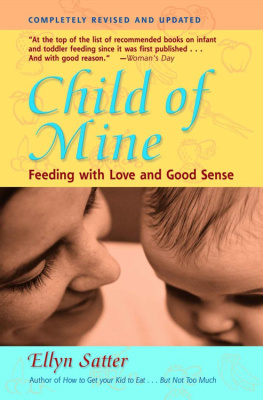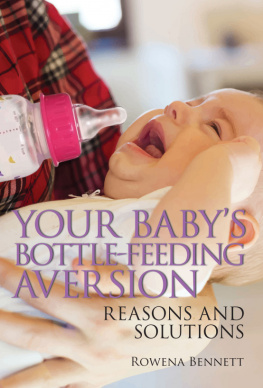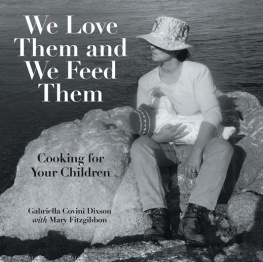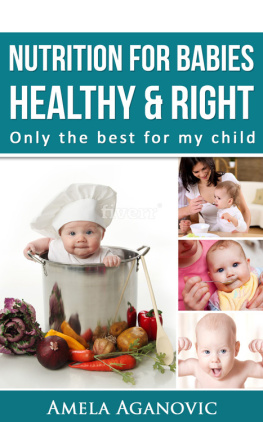Feeding with Love and Good Sense: 18 Months through 6 Years
Copyright 2014 by Ellyn Satter
Kelcy Press
4226 Mandan Crescent, Suite 57
Madison, WI 53711-3062
877 844 0857
www.KelcyPress.com
All rights reserved. No part of this book may be reproduced or transmitted in any form or by any means, electronic or mechanical, including photocopying and recording or by any information storage and retrieval, without permission in writing from Ellyn Satter.
ISBN 978-0-9671189-8-7
Publishers Cataloging-in-Publication Data Feeding with Love and Good Sense: 18 Months through 6 Years
1. Parenting. Infants and toddlers. 2. Feeding. 3. The family and family meals. 4. Children. Child development.
Developmental editor, Nancy Pekar
Kelcy Press books are available at special discounts for bulk purchases. For more information, contact Kelcy Press.
Distributed by
Ellyn Satter Institute
www.EllynSatterInstitute.org
608-318-1600


Table of Contents
You can have enjoyable, harmonious meals. Your child can be healthy, feel good about eating, and behave well around food.
To raise a healthy child who eats and grows well, do your jobs with feeding and parenting, then trust your child to do her jobs with eating, moving, and growing.
Consider the toddler, the preschooler, and the school-age child. Being able to recognize stages in development and understand temperament lets you trust and enjoy your child and parent in the best way.
. Look forward to greater mealtime tranquility as your child gets older.
You are now feeding a family and including your child in family meals. You are no longer just feeding your child.
Consider the picky eater, the child who doesnt eat meals and then begs for food, the large child, the small child, the child who doesnt eat much, the child who doesnt eat vegetables or drink milk, or the child with special needs.
Feeding is parenting in all ways. You have to do your jobs, but then you have to let go. Throughout the growing-up years, maintain a division of responsibility in feeding.
Dedication: This booklet is dedicated to you, the parent, and all the caring adults who are helping feed your child with love and good sense.
A message from Ellyn Satter
By the time your child is a toddler, you will have navigated a lot of pitfalls with respect to your childs learning to eat grown-up food. Consider these scenarios:

 Your child happily eats solid food. Or he doesnt. But you are relaxed. Some children dont get interested in solids until they can finger-feed themselves.
Your child happily eats solid food. Or he doesnt. But you are relaxed. Some children dont get interested in solids until they can finger-feed themselves.

 One day he refuses to let you feed him and grabs for the spoon. Through careful observation and deduction or sheer luck, you correctly figure out he wants to feed himself. Resisting the entirely natural response to play here comes the airplane, you let him.
One day he refuses to let you feed him and grabs for the spoon. Through careful observation and deduction or sheer luck, you correctly figure out he wants to feed himself. Resisting the entirely natural response to play here comes the airplane, you let him.

 She enthusiastically eats with her fingers almost everything that is offered. She loves joining in with family meals. Whew!
She enthusiastically eats with her fingers almost everything that is offered. She loves joining in with family meals. Whew!

 Suddenly, he gets picky. He eats very little, is skeptical of foods that he has eaten many times before, and reacts to the mildest suggestion about food as if you are Attila the Hun (with apologies to all Huns everywhere). Being by now a seasoned observer, you resist the impulse to make special food or try to get him to eat, and correctly interpret this behavior as being natural for a toddler.
Suddenly, he gets picky. He eats very little, is skeptical of foods that he has eaten many times before, and reacts to the mildest suggestion about food as if you are Attila the Hun (with apologies to all Huns everywhere). Being by now a seasoned observer, you resist the impulse to make special food or try to get him to eat, and correctly interpret this behavior as being natural for a toddler.

 Again suddenly, you sail into quiet waters. After months of skirmishing around food and everything else, your child becomes a preschooler and then a school-age child. She is more willing to try new food and is relaxing to have at family meals. There are pitfalls to come, but you can handle them!
Again suddenly, you sail into quiet waters. After months of skirmishing around food and everything else, your child becomes a preschooler and then a school-age child. She is more willing to try new food and is relaxing to have at family meals. There are pitfalls to come, but you can handle them!
On the other hand, you, like a lot of other parents, may have fallen into the pitfalls rather than steering around them. You are left with food hassles or a child who eats only a short list of foods. Family meals may be so unpleasant that you consider giving up on them.
It is not too late! Your child is still very young. If you change your ways with feeding and keep them changed, s/he will be a competent eater and you will enjoy feeding. This booklet tells you how.

Focus on how you feed and how your child behaves at mealtime, not on what your child eats. When you maintain the quality of your feeding relationship rather than worrying about what or how much your child eats, your child will eat and grow well and, sooner or later, he will learn to eat almost everything you eat. In the meantime, understand and expect normal child eating behavior. It is normal for your child to be a picky eater, to eat only one or two foods from any meal, to eat a food one time and ignore it another, to eat a lot one time and not much another, and to not eat vegetables.
You can make up for past feeding mistakes
If your child is not a competent eater, do not despair. Follow the guidelines in this booklet and all will be well. She is still very young, and when you change your ways with feeding and keep them changed, she will change her ways with eating.
Your child is a competent eater when...

 He feels good about eating. He enjoys food and joins in happily with family meals and snacks.
He feels good about eating. He enjoys food and joins in happily with family meals and snacks.

 He enjoys meals and behaves nicely at mealtime. He feels good about being included in family meals and does his part to make mealtime pleasant. He does not make a fuss.
He enjoys meals and behaves nicely at mealtime. He feels good about being included in family meals and does his part to make mealtime pleasant. He does not make a fuss.

 He picks and chooses from food you eat with only minor chewing/swallowing/seasoning changes. He is okay with being offered food he has never seen before. He ignores food he does not want and also sneaks up on new food and learns to like it. Eventually he will learn to eat almost everything you do.
He picks and chooses from food you eat with only minor chewing/swallowing/seasoning changes. He is okay with being offered food he has never seen before. He ignores food he does not want and also sneaks up on new food and learns to like it. Eventually he will learn to eat almost everything you do.

Next page












